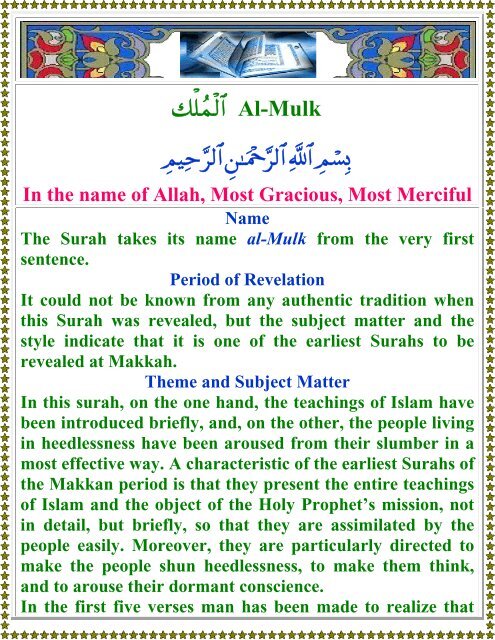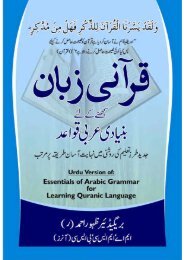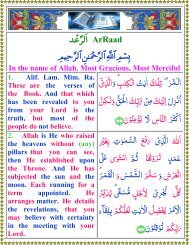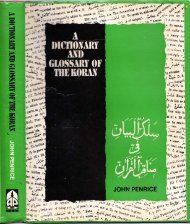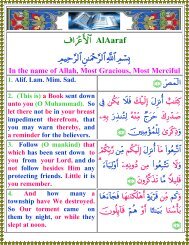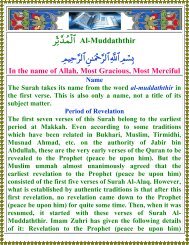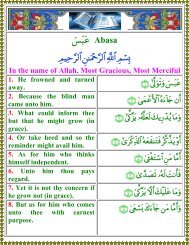7ų=ßϑø9$# Al-Mulk ÉΟóĄÎ0 «!$# Į⎯≈uΗũq§9 ... - Quran PDA
7ų=ßϑø9$# Al-Mulk ÉΟóĄÎ0 «!$# Į⎯≈uΗũq§9 ... - Quran PDA
7ų=ßϑø9$# Al-Mulk ÉΟóĄÎ0 «!$# Į⎯≈uΗũq§9 ... - Quran PDA
Create successful ePaper yourself
Turn your PDF publications into a flip-book with our unique Google optimized e-Paper software.
7ù=ßϑø9<strong>$#</strong> <strong>Al</strong>-<strong>Mulk</strong><br />
ÉΟŠÏm§9<strong>$#</strong> Ç⎯≈uΗ÷q§9<strong>$#</strong> <strong>«</strong>!<strong>$#</strong> ÉΟó¡Î0<br />
In the name of <strong>Al</strong>lah, Most Gracious, Most Merciful<br />
Name<br />
The Surah takes its name al-<strong>Mulk</strong> from the very first<br />
sentence.<br />
Period of Revelation<br />
It could not be known from any authentic tradition when<br />
this Surah was revealed, but the subject matter and the<br />
style indicate that it is one of the earliest Surahs to be<br />
revealed at Makkah.<br />
Theme and Subject Matter<br />
In this surah, on the one hand, the teachings of Islam have<br />
been introduced briefly, and, on the other, the people living<br />
in heedlessness have been aroused from their slumber in a<br />
most effective way. A characteristic of the earliest Surahs of<br />
the Makkan period is that they present the entire teachings<br />
of Islam and the object of the Holy Prophet’s mission, not<br />
in detail, but briefly, so that they are assimilated by the<br />
people easily. Moreover, they are particularly directed to<br />
make the people shun heedlessness, to make them think,<br />
and to arouse their dormant conscience.<br />
In the first five verses man has been made to realize that
the universe in which he lives is a most well organized and<br />
fortified kingdom in which he cannot detect any fault, any<br />
weakness or flaw, however hard he may try to probe. This<br />
kingdom has been brought from nothing into existence by<br />
<strong>Al</strong>lah <strong>Al</strong>mighty Himself and all the powers of controlling,<br />
administering and ruling it are also entirely in <strong>Al</strong>lah’s hand<br />
and His power is infinite. Besides, man has also been told<br />
that in this wise system he has not been created without a<br />
purpose, but he has been sent here for a test and in this test<br />
he can succeed only by his righteous deeds and conduct.<br />
In verses 6-11, dreadful consequences of disbelief which<br />
will appear in the Hereafter have been mentioned, and the<br />
people have been told that <strong>Al</strong>lah, by sending His Prophets,<br />
has warned them of these consequences in this very world,<br />
as if to say: Now, if you do not believe in what the Prophets<br />
say and correct your attitude and behavior accordingly, in<br />
the Hereafter you will yourself have to admit that you<br />
really deserved the punishment that was being meted out to<br />
you.<br />
In verses 12-l4, the truth that has been impressed on the<br />
minds is that the Creator cannot be unaware of His<br />
creation, as if to say: He is aware of each open and hidden<br />
secret of yours, even of the innermost ideas of your hearts.<br />
Hence, the right basis of morality is that man should avoid<br />
evil, fearing the accountability of the unseen God, whether<br />
in the world there is a power to take him to task for this or<br />
not, and whether in the world there is a possibility of being<br />
harmed by such a power or not. Those who adopt such a<br />
conduct in the world alone will deserve forgiveness and a
ich reward in the Hereafter.<br />
In verses 15-23, making allusions, one after the other to<br />
those common truths of daily occurrence, which man does<br />
not regard as worthy of much attention, he has been invited<br />
to consider them seriously. It has been said: Look: the<br />
earth on which you move about with full satisfaction and<br />
peace of mind, and from which you obtain your sustenance<br />
has been subdued for you by <strong>Al</strong>lah; otherwise this earth<br />
might at any time start shaking suddenly so as to cause<br />
your destruction, or a typhoon might occur, which may<br />
annihilate you completely. Look at the birds that fly above<br />
you; it is only <strong>Al</strong>lah Who is sustaining them in the air. Look<br />
at your own means and resources, if <strong>Al</strong>lah wills to inflict<br />
you with a scourge, none can save you from it. And if <strong>Al</strong>lah<br />
wills to close the doors of sustenance on you, none can open<br />
them for you. These things are there to make you aware of<br />
the truth, but you see them like animals, which are unable<br />
to draw conclusions from observations, and you do not use<br />
your sight, hearing and minds which <strong>Al</strong>lah has bestowed on<br />
you as men. That is why you do not see the right way.<br />
In verses 24-27, it has been said: You have to ultimately<br />
appear before your God in any case. It is not for the<br />
Prophet to tell you the exact time and date of the event. His<br />
only duty is to warn you beforehand of its inevitable<br />
occurrence. Today you do not listen to him and demand<br />
that he should cause the event to occur and appear<br />
prematurely before you; but when it does occur, and you<br />
see it with your own eyes, you will then be astounded. Then,<br />
it will be said to you: This is the very thing you were calling
to be hastened.<br />
In verses 28-29, replies have been given to what the<br />
disbelievers of Makkah said against the Prophet (peace be<br />
upon him) and his companions. They cursed the Prophet<br />
(peace be upon him) and prayed for his and the believers’<br />
destruction. To this it has been said: Whether those who<br />
call you to the right way are destroyed or shown mercy by<br />
<strong>Al</strong>lah, how will their fate change your destiny? You should<br />
look after yourselves and consider who would save you if<br />
you were overtaken by the scourge of God. You regard<br />
those who believe in God and put their trust in Him as the<br />
misguided. A time will come when it will become evident as<br />
to who was misguided.<br />
In conclusion, the people have been asked this question and<br />
left to ponder over it: If the water which has come out from<br />
the earth at some place in the desert or hill country of<br />
Arabia and upon which depends your whole life activity,<br />
should sink and vanish underground, who beside <strong>Al</strong>lah can<br />
restore to you this life giving water.<br />
1. Blessed *1 is He in Whose<br />
hand is the dominion, *2 and<br />
He has power over<br />
everything. *3<br />
uθèδuρ<br />
à7ù=ßϑø9<strong>$#</strong><br />
∩⊇∪<br />
Íνωu‹Î/<br />
íƒÏ‰s%<br />
“Ï%©!<strong>$#</strong><br />
&ó©x<strong>«</strong><br />
Èe≅ä.<br />
x8t≈t6s?<br />
4’n?tã<br />
*1 Tabaraka is a superlative from barkat. Barkat<br />
comprehends the meanings of exaltation and greatness,<br />
abundance and plentiful, permanence and multiplicity of<br />
virtues and excellences. When the superlative tabaraka is<br />
formed from it, it gives the meaning that <strong>Al</strong>lah is infinitely<br />
noble and great. He is superior to everything beside
Himself in His essence and attributes and works. His<br />
beneficence is infinite, and His excellences are permanent<br />
and everlasting. (For further explanation, see E.N. 43 of<br />
Surah <strong>Al</strong>-Aaraf; E.N. 1-4 of Surah <strong>Al</strong>-Muminoon; E.Ns 1<br />
and 19 of Surah <strong>Al</strong>-Furqan).<br />
*2 As the word al-<strong>Mulk</strong> has been used, it cannot be taken in<br />
any limited meaning. Inevitably, it would imply sovereignty<br />
over everything that exists in the universe. In Whose hand<br />
is the dominion does not mean that He has physical hands,<br />
but that He is possessor of all power and authority and no<br />
one else has any share in it.<br />
*3 That is, He can do whatever He wills, nothing can<br />
frustrate or hinder Him from doing what He pleases.<br />
2. Who created death<br />
and life that He may test<br />
you which of you is best in<br />
deed, *4 and He is <strong>Al</strong>l Mighty,<br />
<strong>Al</strong>l Forgiving. *5<br />
nο4θu‹ptø:<strong>$#</strong>uρ |Nöθyϑø9<strong>$#</strong> t,n=y{ “Ï%©!<strong>$#</strong><br />
4 WξuΚtã ß⎯|¡ômr& ö/ä3•ƒr& öΝä.uθè=ö7u‹Ï9<br />
∩⊄∪ â‘θàtóø9<strong>$#</strong> Ⓝ͕yèø9<strong>$#</strong> uθèδuρ<br />
*4 That is, the object of giving life to man in the world and<br />
causing his death is to test him to see which of them is best<br />
in deeds. <strong>Al</strong>lusion has been made in this brief sentence to a<br />
number of truths:<br />
(1) That life and death are given by <strong>Al</strong>lah, no one else can<br />
grant life nor cause death.<br />
(2) That neither the life nor the death of a creation like<br />
man, which has been given the power to do both good and<br />
evil, is purposeless. The Creator has created him in the<br />
world for the test. Life is for him the period of the test and
death means that the time allotted for the test has come to<br />
an end.<br />
(3) That for the sake of this very test the Creator has given<br />
every man an opportunity for action, so that he may do<br />
good or evil in the world and practically show what kind of<br />
a man he is.<br />
(4) That the Creator alone will decide who has done good<br />
or evil. It is not for us to propose a criterion for the good<br />
and the evil deeds but for <strong>Al</strong>mighty <strong>Al</strong>lah. Therefore,<br />
whoever desires to get through the test, will have to find out<br />
what is the criterion of a good deed in His sight. Every<br />
person will be recompensed according to his deeds, for if<br />
there was no reward or punishment the test would be<br />
meaningless.<br />
*5 This has two meanings and both are implied here:<br />
(1) That He is <strong>Al</strong>mighty, in spite of being dominant over all<br />
His creatures, He is Merciful and Forgiving for them, not<br />
tyrannous and cruel.<br />
(2) That He has full power to punish the evildoers. No one<br />
can escape His punishment. But He is forgiving for him<br />
who feels penitent, refrains from evil and asks for His<br />
forgiveness.<br />
3. Who created seven<br />
heavens one above the<br />
other. *6 You will not see any<br />
fault in the creation of the<br />
Beneficent. *7 Then turn up<br />
your eyes, do you see any<br />
flaw. *8<br />
( $]%$t7ÏÛ ;N≡uθ≈yϑy yìö7y t,n=y{ “Ï%©!<strong>$#</strong><br />
⎯ÏΒ Ç⎯≈uΗ÷q§9<strong>$#</strong> È,ù=yz †Îû 3“ts? $¨Β<br />
3“ts? ö≅yδ u|Çt7ø9<strong>$#</strong> ÆìÅ_ö‘$$sù ( ;Nâθ≈xs?<br />
∩⊂∪9‘θäÜèù⎯ÏΒ
*6 For explanation, see E.N. 34 of Surah <strong>Al</strong>-Baqarah; E.N.<br />
2 of Surah Ar-Raad; E.N. 8 of Surah <strong>Al</strong>-Hijr; E.N. 113 of<br />
Surah <strong>Al</strong>-Hajj; E.N. 15 of Surah <strong>Al</strong>-Muminoon; E.N. 5 of<br />
Surah As-Saaffat; E.N. 90 of Surah <strong>Al</strong>-Mumin.<br />
*7 Literally, tafawut is disproportion: two things being out<br />
of accord and in disagreement with each other. So, the<br />
divine words mean: You will not see any indiscipline, any<br />
disorder and discordance anywhere in the universe, there is<br />
nothing disjointed and out of proportion in this world<br />
created by <strong>Al</strong>lah: all its parts are well connected and in<br />
perfect harmony and coordination.<br />
*8 The word futoor means a crack, rift, fissure, or a thing’s<br />
being split and broken. The verse means to say that the<br />
whole universe is so closely well-knit and everything in it,<br />
from a particle on the earth to the huge galaxies, so well<br />
connected and coherent that the continuity of the system of<br />
the universe seems to break nowhere, however hard one<br />
may try to probe and investigate. (For further explanation,<br />
see E.N. 8 of Surah Qaf).<br />
4. Then look again and<br />
ó=Î=s)Ζtƒ È⎦÷⎫s?§x. u|Çt7ø9<strong>$#</strong> ÆìÅ_ö‘<strong>$#</strong> §ΝèO<br />
yet again, (your) sight will<br />
return to you humbled, and<br />
×Å¡ym uθèδuρ $Y∞Å%s{ ç|Çt7ø9<strong>$#</strong> y7ø‹s9Î)<br />
worn out.<br />
5. And indeed, We have<br />
adorned the world’s heaven *9<br />
with lamps (stars), *10 and<br />
We have made them a means<br />
$u‹÷Ρ‘‰9<strong>$#</strong><br />
$YΒθã_â‘<br />
u!$yϑ¡¡9<strong>$#</strong><br />
$yγ≈oΨù=yèy_uρ<br />
$¨Ζ−ƒy—<br />
∩⊆∪<br />
ô‰s)s9uρ<br />
yxŠÎ6≈|ÁyϑÎ/
of driving away devils. *11 And<br />
We have prepared for them<br />
the punishment of the blazing<br />
Fire.<br />
z>#x‹tã<br />
öΝçλm;<br />
$tΡô‰tGôãr&uρ<br />
(<br />
È⎦⎫ÏÜ≈u‹¤±=Ïj9<br />
∩∈∪ÎÏè¡¡9<strong>$#</strong><br />
*9 The world’s heaven: the heaven the stars and planets of<br />
which can be seen with the naked eye; the objects beyond<br />
that which can be seen only through telescopes are the<br />
distant heaven; and the heavens still farther away are those<br />
which have not yet been seen even with telescopes.<br />
*10 The word masabih in the original has been used as a<br />
common noun, and therefore, automatically gives the<br />
meaning of the lamp’s being splendid and glorious. It<br />
means: We have not created this universe dark, dismal and<br />
desolate, but have beautified and decorated it with stars,<br />
the glory and grandeur of which at night strike man with<br />
amazement.<br />
*11 This does not mean that the stars themselves are pelted<br />
at the Satans, nor that the meteorites shoot out only to<br />
drive away the Satans, but it means that the countless<br />
meteorites which originate from the stars and wander in<br />
space at tremendous speeds and which also fall to the earth<br />
in a continuous shower prevent the Satans of the earth<br />
from ascending to the heavens. Even if they try to ascend<br />
heavenward these meteorites drive them away. This thing<br />
has been mentioned here because the Arabs believed about<br />
the soothsayers, and this also was the claim made by the<br />
soothsayers themselves, that the Satans were under their<br />
control, or that they had a close contact with them, and<br />
through them they received news of the unseen, and thus,
could foretell the destinies of the people. That is why at<br />
several places in the <strong>Quran</strong>, it has been stated that there is<br />
absolutely no possibility for the Satans ascending to the<br />
heavens and bringing news of the unseen. (For explanation,<br />
see E.Ns 9-12 of Surah <strong>Al</strong>-Hijr, E.Ns 6, 7 of Surah As-<br />
Saaffat).<br />
As for the truth about meteorites, man’s information in this<br />
regard is still without a scientific basis. However, the theory<br />
which seems best to account for all the facts known today<br />
and the information gathered from the examination of the<br />
meteorites fallen on the earth, is that meteorites originate<br />
from the disintegration of one or more planets and wander<br />
in space and sometimes fall to the earth under its<br />
gravitational pull. (See Encyclopedia Britannica, vol. XV,<br />
under Meteorites).<br />
6. And for those who<br />
disbelieve in their Lord *12 is<br />
the punishment of Hell, and<br />
an evil abode.<br />
Ü>#x‹tã<br />
öΝÍκÍh5tÎ/<br />
(#ρãxx.<br />
t⎦⎪Ï%©#Ï9uρ<br />
∩∉∪çÅÁyϑø9<strong>$#</strong><br />
}§ø♥Î/uρ(<br />
zΝ¨Ψyγy_<br />
*12 That is, the fate of all those, whether men or Satans,<br />
who disbelieve in their Lord. (For the explanation of the<br />
meaning of disbelieving in the Lord (Rabb), see E.N 161 of<br />
Surah <strong>Al</strong>-Baqarah; E.N. 178 of Surah An-Nisa; E.N. 39 of<br />
Surah <strong>Al</strong>-Kahf; E.N. 3 of Surah <strong>Al</strong>-Momin.<br />
7. When they are cast into it,<br />
they will hear its roaring, *13 $Z)‹Íκy− $oλm; (#θãèÏÿxœ $pκÏù (#θà)ø9é& !#sŒÎ)<br />
and it will be boiling up.<br />
∩∠∪â‘θàs?<br />
}‘Éδuρ<br />
*13 The word shahiq is used for producing a cry like the
donkey’s braying. The sentence may also mean that it could<br />
be the sound of Hell itself, as well as that it would be the<br />
sound coming from Hell, where the people already flung<br />
into it would be screaming and crying. This second<br />
meaning is supported by Surah Houd, Ayat 106, where it<br />
has been said: Therein they will pant and hiss (because of<br />
thirst), and the first meaning is confirmed by Surah <strong>Al</strong>-<br />
Furqan, Ayat 12, which says: When the Hell will see them<br />
from afar, they will hear the sounds of its raging and<br />
roaring. On this basis, the correct meaning is that it would<br />
be the noise made both by Hell and by the dwellers of Hell.<br />
8. It almost bursts with<br />
rage. Every time a group<br />
is cast into it, its keepers<br />
will ask them: “Did there<br />
not come to you a<br />
warner.” *14<br />
u’Å+ø9é& !$yϑ¯=ä. ( Åáø‹tóø9<strong>$#</strong> z⎯ÏΒ ã”¨yϑs? ߊ%s3s?<br />
ö/ä3Ï?ù'tƒóΟs9r&!$pκçJtΡt“yz<br />
öΝçλm;r'y Ólöθsù$pκÏù<br />
∩∇∪փɋtΡ<br />
*14 The real nature of this question will not be of a<br />
question that the keepers of Hell would like to ask them<br />
whether a warner from <strong>Al</strong>lah had come to them or not, but<br />
the object would be to make them realize that no injustice<br />
had been done to them by casting them into Hell. They<br />
would try to make them confess that <strong>Al</strong>lah had not kept<br />
them uninformed and unwarned. He had sent the Prophets<br />
to them. He had informed them of the truth and of the right<br />
way. He had warned them that if they followed a way other<br />
than the right way, it would lead them to Hell, in which<br />
they had been cast. But they had not listened to the<br />
Prophets. Hence, they rightly deserved the punishment
which was being meted out to them at that time.<br />
This thing has been pointed out over and over again in the<br />
<strong>Quran</strong> that the test for which <strong>Al</strong>lah has sent man in the<br />
world is not being conducted by keeping man absolutely<br />
unaware and uninformed of the requirements of the test<br />
only to see whether he found the right way by himself or<br />
not; but <strong>Al</strong>lah has made the most appropriate<br />
arrangements that could possibly be made of guiding him<br />
to the right way, and it is that He has raised the Prophets<br />
and sent down the Books. Now the test of man lies in this<br />
whether he accepts the Prophets and the Books brought by<br />
them and adopts the straight way, or turns away from them<br />
to follow his own desires, wishes and speculations. Thus, the<br />
Prophethood, in fact, is <strong>Al</strong>lah’s argument which He has<br />
established against man and his entire future life depends<br />
on its acceptance or rejection. No one, after the<br />
appointment of the Prophets, can present the excuse that he<br />
remained unaware of the truth, or that he has been caught<br />
and put to the hard test unawares, or that he is being<br />
punished while he was innocent. This theme has been<br />
presented in many different ways in the <strong>Quran</strong>; for<br />
instance, see Surah <strong>Al</strong>-Baqarah, Ayat 213, and E.N. 230;<br />
Surah An-Nisa, Ayats 41-42, 165 and E.Ns 64 and 208;<br />
Surah <strong>Al</strong>-Anaam, Ayats 130-131 and E.Ns 98-100; Surah<br />
Bani Israil, Ayat 15 and E.N. 17; Surah Ta Ha, Ayat 134;<br />
Surah <strong>Al</strong>-Qasas, Ayats 47, 59, 65 and E.Ns 66, 83; Surah<br />
Fatir, Ayat 37; Surah <strong>Al</strong>-Momin, Ayat 50 and E.N. 66.<br />
9. They will say: “Yes<br />
$uΖö/¤‹s3sù<br />
փɋtΡ $tΡu!%y` ô‰s% 4’n?t/ (#θä9$s%<br />
indeed, a warner did come
to us, but we denied and<br />
said, <strong>Al</strong>lah has not sent<br />
down anything. You are<br />
not but in great error.” *15<br />
óΟçFΡr&÷βÎ)<br />
>ó©x<strong>«</strong> ⎯ÏΒ ª!<strong>$#</strong> tΑ¨“tΡ $tΒ $uΖù=è%uρ<br />
∩®∪9Î7x.<br />
9≅≈n=|Ê’ÎûωÎ)<br />
*15 That is, not only you but the people who have believed<br />
in and followed you also are misguided and lost in grave<br />
error.<br />
10. And they will say: “If<br />
we had listened or<br />
understood, *16 $tΒ ã≅É)÷ètΡ ÷ρr& ßìyϑó¡nΣ $¨Ζä. öθs9 (#θä9$s%uρ<br />
we would not<br />
∩⊇⊃∪ÎÏè¡¡9<strong>$#</strong><br />
É=≈ptõ¾r&þ’Îû$¨Ζä.<br />
be among the dwellers of the<br />
blazing Fire.”<br />
*16 If we had listened or understood: If we had listened to<br />
the Prophets with attention as seekers after truth or used<br />
our intellect to understand what actually was the message<br />
they were presenting before us. Here listening has been<br />
given priority over understanding, the reason being that<br />
the pre-requisite of obtaining guidance is to listen to what<br />
the Prophet teaches, or to read if it is in the written form,<br />
like a seeker after truth. To ponder over it in an attempt to<br />
understand the truth is secondary. Without the Prophet’s<br />
guidance man cannot by himself reach the truth directly by<br />
using his intellect and common sense.<br />
11. Then will they confess<br />
of their sin. *17 $Z)ósÝ¡sù öΝÍκÈ:/Ρx‹Î/ (#θèùutIôã$$sù<br />
So, far removal<br />
(the mercy) for the dwellers<br />
∩⊇⊇∪ÎÏè¡¡9<strong>$#</strong><br />
É=≈ysô¹X{<br />
of Hell.<br />
*17 The word dhanb (sin) has been used in the singular. It<br />
means that the real sin because of which they became
worthy of Hell was to belie the Messengers and refuse to<br />
obey them. <strong>Al</strong>l other sins are its consequences.<br />
12. Indeed, those who fear<br />
their Lord unseen, *18 Í=ø‹tóø9$$Î/ Νßγ−/u‘ tβöθt±øƒs† t⎦⎪Ï%©!<strong>$#</strong> ¨βÎ)<br />
for<br />
them is forgiveness and a<br />
∩⊇⊄∪×Î7x.<br />
Öô_r&uρ×οtÏøó¨ΒΟßγs9<br />
great reward. *19<br />
*18 This is the real basis of morality in religion. A person’s<br />
refraining from an evil because it is an evil in his personal<br />
opinion, or because the world regards it as an evil, or<br />
because its commission is likely to bring loss in the world,<br />
or because it may entail a punishment by a worldly power,<br />
is a very flimsy basis for morality. A man’s personal<br />
opinion may be wrong, he may regard a good thing as bad<br />
and a bad thing as good because of some philosophy of his<br />
own. In the first place, the worldly standards of good and<br />
evil have never been the same, they have been changing<br />
from time to time. No universal and eternal standard in the<br />
moral philosophies is found today, nor has it ever been<br />
found before. The fear of worldly loss also does not provide<br />
a firm foundation for morality. The person who avoids an<br />
evil because he fears the loss that may result from it for<br />
himself cannot keep himself from committing it when there<br />
is no fear of incurring such a loss. Likewise, the danger of<br />
the punishment by a worldly power also is not something<br />
which can turn a person into a gentleman. Everybody<br />
knows that no worldly power is knower of both the seen<br />
and the unseen. Many crimes can be committed unseen and<br />
unobserved. Then, there are many possible devices by<br />
which one can escape the punishment of every worldly
power; and the laws made by a worldly power also do not<br />
cover all evils. Most evils are such as they do not come<br />
within the purview of the mundane laws, whereas they are<br />
even worse than the evils which they regard as punishable.<br />
That is why, the religion of truth has raised the edifice of<br />
morality on the basis that one should refrain from an evil in<br />
fear of the unseen God Who sees man under all conditions,<br />
from Whose grasp man cannot escape in any way, Who has<br />
given man an all-pervading, universal and everlasting<br />
criterion of good and evil. To forsake evil and adopt good<br />
only out of fear of Him is the real good which is<br />
commendable in religion. Apart from this, if a man refrains<br />
from committing evil for any other reason or adopts acts<br />
which in view of their external form are regarded as good<br />
acts, his these moral acts will not be worth any merit and<br />
value in the Hereafter, for they are like a building which<br />
has been built on sand.<br />
*19 That is, there are two inevitable results of fearing God<br />
unseen.<br />
(1) That whatever errors and sins one will have committed<br />
because of human weaknesses, will be forgiven provided<br />
these were not committed because of fearlessness of God.<br />
(2) That whatever good acts a man performs on the basis of<br />
this belief, he will be rewarded richly for them.<br />
13. And conceal your talk,<br />
or proclaim it. He certainly<br />
is Knower of what is in the<br />
breasts. *20<br />
( ÿ⎯ÏμÎ/ (#ρãyγô_<strong>$#</strong> Íρr& öΝä3s9öθs% (#ρ•Å r&uρ<br />
∩⊇⊂∪Í‘ρ߉Á9<strong>$#</strong><br />
ÏN#x‹Î/ 7ΟŠÎ=tæ…çμ¯ΡÎ)<br />
*20 The address is to all human beings, whether they are
elievers or unbelievers. For the believer, it contains the<br />
admonition that while living his life in the world he should<br />
always remember that not only his open and hidden deeds<br />
but even his secret intentions and innermost thoughts are<br />
not hidden from <strong>Al</strong>lah. And for the unbeliever, the warning<br />
that he may do whatever he may please fearless of God, but<br />
nothing that he does can remain un-noticed and unseen by<br />
Him.<br />
14. Would He not know, who<br />
has created. *21 And He is the<br />
Subtle, *22 ß#‹Ïܯ=9<strong>$#</strong> uθèδuρ t,n=y{ ô⎯tΒ ãΝn=÷ètƒ Ÿωr&<br />
the <strong>Al</strong>l Aware.<br />
∩⊇⊆∪çÎ7sƒø:<strong>$#</strong><br />
*21 Another translation can be: Would He not know His<br />
own creatures? In the original text khalaqa has been used,<br />
which may mean: Who has created as well as whom He has<br />
created, In both cases the meaning remains the same. This<br />
is the argument for what has been said in the preceding<br />
sentence. That is, how is it possible that the Creator should<br />
be unaware of His creation? The creation may remain<br />
unaware of itself, but the Creator cannot be unaware of it.<br />
He has made every vein of your body, every fiber of your<br />
heart and brain. You breathe because He enables you to<br />
breathe, your limbs function because He enables them to<br />
function, How then can anything of yours remain hidden<br />
from Him.<br />
*22 The word Latif as used in the original means the One<br />
Who works in imperceptible ways as well as the One Who<br />
knows the hidden truths and realities.
15. It is He who has made<br />
the earth subservient to you,<br />
so walk about in the paths<br />
thereof, and eat of His<br />
provisions. *23 And to Him is<br />
the resurrection. *24<br />
uÚö‘F{<strong>$#</strong> ãΝä3s9 Ÿ≅yèy_ “Ï%©!<strong>$#</strong> uθèδ<br />
(#θè=ä.uρ $pκÈ:Ï.$uΖtΒ ’Îû (#θà±øΒ$$sù Zωθä9sŒ<br />
∩⊇∈∪â‘θà±–Ψ9<strong>$#</strong><br />
Ïμø‹s9Î)uρ(<br />
⎯ÏμÏ%ø—Íh‘<br />
⎯ÏΒ<br />
*23 That is, this earth has not become subdued for you of<br />
its own accord, and the provisions also that you are eating<br />
have not become available here by themselves, but <strong>Al</strong>lah<br />
has so arranged it by His wisdom and power that your life<br />
became possible here and this splendid globe became so<br />
peaceful that you are moving about on it with full peace of<br />
mind, and it has become such a vast table spread with food<br />
that it contains endless and limitless provisions for your<br />
sustenance. If you are not lost in heedlessness and look<br />
about yourself intelligently, you will find how much wisdom<br />
underlies in the making of this earth habitable for you and<br />
arranging in it immeasurable stores of provisions for you.<br />
(For explanation, see E.Ns 73, 74, 81 of Surah An-Naml;<br />
E.Ns 29, 32 of Surah YaSeen; E.Ns 90, 91 of <strong>Al</strong>-Momin,<br />
E.N. 7 of Surah Az-Zukhruf, E.N. 7 of Surah <strong>Al</strong>-Jathiyah,<br />
E.N. 18 of Surah Qaf).<br />
*24 That is, while you move about on the earth and eat of<br />
what <strong>Al</strong>lah has provided for you here, you should not<br />
forget that ultimately you have to appear before God one<br />
day.<br />
16. Have you taken security<br />
from Him Who is in the<br />
heaven *25 y#Å¡øƒs†<br />
βr& Ï!$yϑ¡¡9<strong>$#</strong> ’Îû ⎯¨Β Λä⎢ΨÏΒr&u<br />
that He will not
cause the earth to swallow<br />
you when it shakes (as in an<br />
earthquake).<br />
â‘θßϑs?<br />
š†Ïφ<br />
#sŒÎ*sù<br />
uÚö‘F{<strong>$#</strong><br />
ãΝä3Î/<br />
∩⊇∉∪<br />
*25 This does not mean that <strong>Al</strong>lah lives in the heavens, but<br />
it has been so said because man naturally looks up to the<br />
heaven whenever he wants to turn to <strong>Al</strong>lah, raises his hands<br />
heavenward in prayer and implores <strong>Al</strong>lah turning his eyes<br />
up to heaven whenever he finds himself helpless in an<br />
affliction. Then whenever a calamity befalls him suddenly,<br />
he says it has descended from heaven; whenever something<br />
unusual happens, he says it has come from heaven; and he<br />
calls the Books revealed by <strong>Al</strong>lah as heavenly Books.<br />
Accordingly to a tradition in Abu Daud, a person came<br />
before the Prophet (peace be upon him) with a black slavegirl<br />
and said: It has become obligatory on me to set a slave<br />
free; can I set this slave-girl free? Prophet (peace be upon<br />
him) asked the slave-girl: Where is <strong>Al</strong>lah? She pointed<br />
heavenward with her forger. The Prophet (peace be upon<br />
him) asked: Who am I? She first pointed towards him and<br />
then towards the heaven, by which she obviously meant to<br />
say: You have come from <strong>Al</strong>lah. Thereupon the Prophet<br />
(peace be upon him) said: Set her free; she is a believer. (A<br />
story closely resembling this has been narrated in Muwatta,<br />
Muslim and Nasai also). About Khawla bint Thaibah,<br />
Umar once said to the people: She is the lady whose<br />
complaint was heard above the seven heavens. (In E.N. 2 of<br />
Surah al-Mujadalah, we have given full details concerning<br />
this). <strong>Al</strong>l this clearly shows that it is natural with man that
whenever he thinks of God, his mind turns to the heaven<br />
above and not to the earth below. In view of this very thing<br />
the words man fis-samaa (He Who is in the heaven) have<br />
been used about <strong>Al</strong>lah. There is no room here for any doubt<br />
that the <strong>Quran</strong> regards <strong>Al</strong>lah <strong>Al</strong>mighty as living in the<br />
heaven. In fact, there cannot be any basis for this doubt, for<br />
in the very beginning of this Surah <strong>Al</strong>-<strong>Mulk</strong>, it has been<br />
stated: He Who created seven heavens, one above the other,<br />
and in Surah <strong>Al</strong>-Baqarah it has been said: You will face<br />
<strong>Al</strong>lah in whatever direction you turn your face. (verse 115).<br />
17. Or have you taken<br />
security from Him Who is in<br />
the heaven that He will not<br />
send upon you a hurricane. *26<br />
Ÿ≅Åöムβr& Ï!$yϑ¡¡9<strong>$#</strong> ’Îû ⎯¨Β Λä⎢ΨÏΒr& ÷Πr&<br />
y#ø‹x. tβθçΗs>÷ètG|¡sù ( $Y6Ϲ%tn öΝä3ø‹n=tæ<br />
Then you shall know how was<br />
∩⊇∠∪̃ɋtΡ<br />
My warning. *27<br />
*26 The object is to impress this: Your very survival and<br />
well-being on the earth are at all times dependent upon<br />
<strong>Al</strong>lah <strong>Al</strong>mighty’s grace and bounty: you are not strutting<br />
about on this earth at will by your own power: you are<br />
under obligation only to <strong>Al</strong>lah’s protection for each<br />
moment of your life that you are passing here, otherwise<br />
<strong>Al</strong>lah at any moment may cause such an earthquake to<br />
occur as may make this very earth to become your grave<br />
instead of the cradle that it is, or may cause a windstorm to<br />
blow razing all your towns and settlements to the ground.<br />
*27 My warning: the warning that was being given through<br />
the Prophet (peace be upon him) and the <strong>Quran</strong> to the<br />
disbelievers of Makkah to the effect: If you do not refrain
from your disbelief and polytheism and do not accept the<br />
message of Tauhid being given to you, you will be<br />
overtaken by the scourge of God.<br />
18. And indeed, those<br />
öΝÎγÎ=ö7s% ⎯ÏΒ t⎦⎪Ï%©!<strong>$#</strong> z>¤‹x. ô‰s)s9uρ<br />
before them denied, then<br />
how (terrible) was My<br />
∩⊇∇∪ÎÅ3tΡtβ%x.<br />
y#ø‹s3sù<br />
reproach. *28<br />
*28 The allusion is to the communities who had belied the<br />
Messengers, who had come to them previously and<br />
consequently been afflicted with divine punishment.<br />
19. Do they not see at the<br />
birds above them, spreading<br />
their wings, and closing<br />
them in. None is upholding<br />
them but the Beneficent. *29<br />
Indeed, He is Seer over<br />
all things. *30<br />
ôΜßγs%öθsù<br />
£⎯ßγä3Å¡ôϑãƒ<br />
Îö©Ü9<strong>$#</strong><br />
$tΒ<br />
4<br />
’n
guardianship. He alone provides the means necessary for<br />
the existence of everything, and He alone keeps watch that<br />
everything created by Him is provided with the necessities<br />
of life.<br />
20. Or who is it that<br />
could be an army for you<br />
to help you other than<br />
the Beneficent. *31 The<br />
disbelievers are not but in<br />
delusion.<br />
ö/ä3©9<br />
ÈβÎ)<br />
4<br />
Ó‰Ζã_<br />
Ç⎯≈uΗ÷q§9<strong>$#</strong><br />
uθèδ<br />
“Ï%©!<strong>$#</strong><br />
Èβρߊ<br />
⎯ÏiΒ<br />
#x‹≈yδ<br />
ô⎯¨Βr&<br />
Οä.çÝÇΖtƒ<br />
∩⊄⊃∪A‘ρãäî’ÎûωÎ)<br />
tβρãÏ≈s3ø9<strong>$#</strong><br />
*31 Another translation can be: Who is there beside the<br />
Merciful, who comes to your rescue as your army? The<br />
translation that we have adopted in the text above has<br />
relevance to the following sentence, and this second to the<br />
preceding discourse.<br />
21. Or who is it that<br />
could provide for you if He<br />
should withhold His<br />
provision. But, they persist<br />
in rebellion and aversion.<br />
22. Then is he who is<br />
walking fallen on his face *32<br />
better guided, or he who is<br />
walking upright on a straight<br />
path.<br />
÷βÎ)<br />
5hθçGãã<br />
ÿ⎯ÏμÎγô_uρ<br />
4’n?tã<br />
ö/ä3è%ã—ötƒ<br />
“Ï%©!<strong>$#</strong><br />
#x‹≈yδ<br />
ô⎯¨Βr&<br />
†Îû (#θ‘∨©9 ≅t/ 4 …çμs%ø—Í‘ y7|¡øΒr&<br />
4’n?tã<br />
$‡ƒÈθy<br />
$‰7Å3ãΒ<br />
©Å´ôϑtƒ<br />
∩⊄⊇∪A‘θàçΡuρ<br />
©Å´ôϑtƒ<br />
⎯¨Βr&<br />
⎯yϑsùr&<br />
#“y‰÷δr&<br />
∩⊄⊄∪8Λ⎧É)tGó¡•Β:Þ≡uÅÀ<br />
*32 Walking fallen on his face: walking with face turned<br />
down like the cattle on the same track on which someone
put him.<br />
23. Say: “It is He who has<br />
created you, and made for<br />
you hearing, and sight, and<br />
hearts. Little thanks is that<br />
you give.” *33<br />
â/ä3s9<br />
(<br />
Ÿ≅yèy_uρ<br />
nοy‰Ï↔øùF{<strong>$#</strong>uρ<br />
ö/ä.r't±Σr&<br />
ü“Ï%©!<strong>$#</strong><br />
t≈|Áö/F{<strong>$#</strong>uρ<br />
uθèδ<br />
ö≅è%<br />
yìôϑ¡¡9<strong>$#</strong><br />
∩⊄⊂∪tβρãä3ô±n@$¨ΒWξ‹Î=s%<br />
*33 That is, <strong>Al</strong>lah had made you men, not cattle. You were<br />
not meant to follow blindly whatever error and deviation<br />
you found prevailing in the world, without considering for<br />
a moment whether the way you had adopted was right or<br />
wrong. You have not been given these ears that you may<br />
refuse to listen to the one who tries to distinguish the right<br />
from the wrong for you, and may persist in whatever false<br />
notions you already had in your mind. You have not been<br />
given these eyes that you may follow others like the blind<br />
and may not bother to see whether the signs scattered<br />
around you in the world testified to the unity of God, which<br />
the Messenger (peace be upon him) of God is preaching, or<br />
whether the system of the universe is Godless, or is being<br />
run by many gods simultaneously. Likewise, you have also<br />
not been given this knowledge and intelligence that you<br />
may give up thinking and understanding to others and may<br />
adopt every crooked way that was enforced by somebody in<br />
the world, and may not use your own intellect to see<br />
whether it was right or wrong. <strong>Al</strong>lah has blessed you with<br />
knowledge and intelligence, sight and hearing, so that you<br />
may recognize the truth, but you are being ungrateful to<br />
Him in that you are employing these faculties for every
other object than the one for which these had been granted.<br />
(For further explanation, see E.Ns 72, 73 of Surah An-<br />
Naml; E.Ns 75, 76 of Surah <strong>Al</strong>-Mominoon; E.Ns 17, 18 of<br />
Surah As-Sajdah; E.N. 31 of Surah <strong>Al</strong>-Ahqaf).<br />
24. Say: “It is He who has<br />
ÇÚö‘F{<strong>$#</strong> ’Îû öΝä.r&u‘sŒ “Ï%©!<strong>$#</strong> uθèδ ö≅è%<br />
dispersed you in the earth,<br />
and to Him you shall be<br />
∩⊄⊆∪tβρç|³øtéBÏμø‹s9Î)uρ<br />
gathered.” *34<br />
*34 That is, after being resurrected from death, you will be<br />
gathered together from every corner of the earth and<br />
presented before <strong>Al</strong>lah.<br />
25. And they say: “When<br />
βÎ) ߉ôãuθø9<strong>$#</strong> #x‹≈yδ 4©tLtΒ tβθä9θà)tƒuρ<br />
will this promise be<br />
(fulfilled) if you are<br />
∩⊄∈∪t⎦⎫Ï%ω≈|¹<br />
÷Λä⎢Ζä.<br />
truthful.” *35<br />
*35 They did not ask this question in order to know the<br />
time and date of Resurrection so that if they were told the<br />
year, the month, the day and time of its occurrence, they<br />
would accept it. But, in fact, they thought that Resurrection<br />
was impossible, and its occurrence remote from reason, and<br />
they asked this question in order to have an excuse for<br />
denying it. They meant to say: When will this strange story<br />
of Resurrection and gathering together, that you are telling<br />
us, materialize? What for has it been put off? Why don’t<br />
you make it appear forthwith so that we are assured of it?<br />
In this connection, one should understand that one can be<br />
certain of Resurrection only by rational arguments, and<br />
these have been elaborated at many places in the <strong>Quran</strong>. As<br />
for the date of its occurrence only an ignorant person could
aise such a question about it, for even if it is told, it does<br />
not make any difference. The unbeliever would say: Well,<br />
when it does occur on the date you tell, I shall then believe<br />
in it; how can I believe today that it will actually occur on<br />
that very day? (For further explanation, see E.N. 63 of<br />
Surah Luqman; E.N. 116 of Surah <strong>Al</strong>-Ahzab; E.Ns 5, 48 of<br />
Surah Saba E.N. 45 of YaSeen).<br />
26. Say: “The knowledge<br />
is only with <strong>Al</strong>lah, and I<br />
am only a clear warner.” *36<br />
O$tΡr& !$yϑ¯ΡÎ)uρ <strong>«</strong>!<strong>$#</strong> y‰ΖÏã ÞΟù=Ïèø9<strong>$#</strong> $yϑ¯ΡÎ) ö≅è%<br />
∩⊄∉∪×⎦⎫Î7•ΒփɋtΡ<br />
*36 That is, this I know that it will certainly come, and<br />
knowing this much only is enough for warning the people<br />
before its actual occurrence. As for the question when it<br />
will actually come, the knowledge of it is with <strong>Al</strong>lah, not<br />
with me, and there is no need of this knowledge for<br />
administering the warning. This can be better understood<br />
by an example. As to the exact time when a person will die,<br />
it is only known to <strong>Al</strong>lah; however, all know that everyone<br />
has to die one day. Our this knowledge is enough that we<br />
may warn a heedless friend of ours that he should look<br />
after himself and his interests before death. For this<br />
warning it is not necessary to know the exact day on which<br />
he will die.<br />
27. Then, when they will<br />
see it approaching, the faces<br />
of those who disbelieve, shall<br />
be distressed, *37 çνθã_ãρ ôMt↔ÿ‹Å Zπxø9ã— çν÷ρr&u‘ $£ϑn=sù<br />
“Ï%©!<strong>$#</strong><br />
#x‹≈yδ Ÿ≅ŠÏ%uρ (#ρãxx. š⎥⎪Ï%©!<strong>$#</strong><br />
and it will be<br />
said: “This is that which
you used to call.” ∩⊄∠∪šχθã㣉s?<br />
⎯ÏμÎ/ Λä⎢Ψä.<br />
*37 That is, they will be in the same agony as is suffered by<br />
the criminal who is being taken to the gallows.<br />
28. Say: “Have you ever<br />
⎯tΒuρ ª!<strong>$#</strong> z©Í_s3n=÷δr& ÷βÎ) óΟçF÷ƒuu‘r& ö≅è%<br />
considered, if <strong>Al</strong>lah should<br />
destroy me and those with<br />
t⎦⎪ÍÏ≈s3ø9<strong>$#</strong> çÅgä† ⎯yϑsù $oΨuΗ¿qu‘ ÷ρr& z©Éë¨Β<br />
me, or should bestow mercy<br />
upon us, who then will save ∩⊄∇∪5ΟŠÏ9r&A>#x‹tãô⎯ÏΒ<br />
the disbelievers from the<br />
painful punishment.” *38<br />
*38 When the Prophet (peace be upon him) started his<br />
mission in Makkah and the members of the different clans<br />
of Quraish began to embrace Islam, the people of every<br />
house started cursing him and his companions. They<br />
started practicing magic and charms on him to cause his<br />
death, even devising plots to kill him. At this, it was said:<br />
Say to them: what will it profit you whether we perish or<br />
we live by the grace of God? You should worry for<br />
yourselves as to how you will save yourselves from the<br />
punishment of <strong>Al</strong>lah?<br />
29. Say: “He is the<br />
Beneficent, we have believed<br />
in Him, and upon Him<br />
have we put our trust. *39 Ïμø‹n=tæuρ ⎯ÏμÎ/ $¨ΖtΒ#u ß⎯≈oΗ÷q§9<strong>$#</strong> uθèδ ö≅è%<br />
’Îû uθèδ ô⎯tΒ tβθçΗs>÷ètG|¡sù ( $uΖù=©.uθs?<br />
So<br />
you will come to know who is<br />
∩⊄®∪&⎦⎫Î7•Β9≅≈n=|Ê<br />
it in clear error.”<br />
*39 That is, we have believed in God, and you are denying<br />
Him; we have put our trust in Him, and you have put your
trust in yourself, your own resources and false deities<br />
besides <strong>Al</strong>lah; therefore, only we deserve to be shown<br />
mercy by <strong>Al</strong>lah, not you.<br />
30. Say: “Have you<br />
considered if the water (of)<br />
your (wells) should sink down<br />
(into the earth), then who<br />
would bring you the flowing<br />
(spring) water.” *40<br />
#Y‘öθxî ö/ä.äτ!$tΒ yxt6ô¹r& ÷βÎ) ÷Λä⎢÷ƒuu‘r& ö≅è%<br />
∩⊂⊃∪¤⎦⎫Ïè¨Β&!$yϑÎ/<br />
/ä3‹Ï?ù'tƒ⎯yϑsù<br />
*40 That is, does anyone else another beside <strong>Al</strong>lah have the<br />
power to restore these springs of water to you? If none else<br />
has this power, and you know well that none has it, then<br />
who is worthy of worship: God or your false deities, who do<br />
not have the power to restore them? Then ask your own<br />
selves as to who is misled and misguided, those who believe<br />
in One God or those who believe in many gods.


